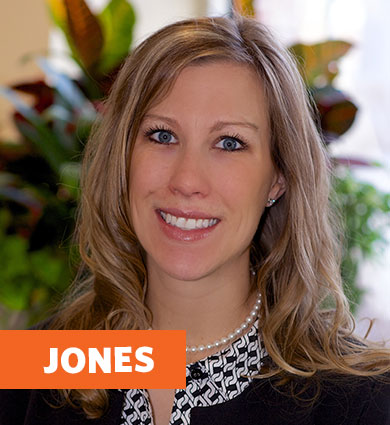
With the increasing popularity of adult coloring books, more and more people are turning to the activity as a means of relaxation but there are also significant health benefits to help counter the struggles of sheltering at home in these pandemic days. To learn more about the psychology of coloring, we turned to Carroll alumna and licensed psychologist Heather Jones ’04, who is director of clinical services at Rogers Memorial Hospital, where she has worked in various positions since first becoming a pre-doctoral intern there in 2011.
After Carroll, she earned her master’s degree in educational psychology in 2005 and an Ed.S. in educational psychology, school psychology emphasis in 2007, both from the University of Nevada-Las Vegas, and her Ph.D. in educational psychology, school psychology emphasis and clinical psychology minor from the University of Wisconsin-Milwaukee in 2014.
In her current position, Jones ensures that clinical staff receives clinical supervision, training, assures quality patient care for all patients admitted to the service, and provides direct patient care as needed.
Jones explained that in the pandemic, people less engaged with their usual environments during the shelter-in-place orders and some—particularly those with underlying depression—might feel more lethargic and avoid simple activities such as getting out of bed or showering, brushing their teeth, or taking the dog for a walk.
“Engaging in a new enjoyable activity like coloring or art projects can strategically decrease avoidance. It helps people identify those areas of life they are avoiding and re-engaging in those,” she said. “When we talk to patients about enjoyable activities, we’ll brainstorm and get really creative. ‘What is something you used to do but haven’t done it in a long time?’ (They’ll say), ‘I used to enjoy coloring when I was a kid’. There’s nothing that says you can’t do that now.”
Learn more from Jones about the health benefits of coloring and then download and try our Carroll University activity and coloring book to engage in a fun activity that is not just for kids anymore.
The first commercially successful adult coloring books were published in 2012 and 2013, but seem to have become much more popular over the last three to four years. Why do you think people are turning to this activity to relieve stress?
Jones: I think many people are looking for something tangible to sort of break up the routine. As something else that I was thinking about is the screen time in relation to the pandemic versus having a pen or having a colored pencil in your hand. There is something about the tangibleness of it. There are apps where you can color but that doesn’t seem appealing to me at all.
What are the health benefits to an activity like coloring for adults trying to de-stress?
Jones: When you’re thinking about doing an online mandala, it takes your full attention. For me, it links to mindfulness. It is very difficult to color something so intricately if you are not paying attention. We talk about improved mood, decreases in anxiety and depression. One area of mindfulness is correlated with relationship satisfaction. We’re stuck in the house with our families, no separation. It can be great but more so than ever, if we’re working less or working differently, it’s really important to take time to do something or try something we might find enjoyable like coloring. Otherwise, the baseline stress we are all experiencing is higher than it would be outside of a pandemic. In order to maintain the relationships with the people we are living with and love and are connected to, it’s really important.
What are some other recreational, art, or horticultural activities that might help people at home during COVID-19?
Jones: We’re all outside of our comfort zone right now and I think leaning into activities that you might not otherwise do: coloring, being outside. I have a friend whose husband works for a bike shop. People are getting their bikes out of their garages and going for bike rides. It’s being creative in the things that you do.
What else might you advise to people who are now sheltering-at-home as a way to help with anxiety or other worries?
Jones: We’re all having to deal with the what ifs or the whens or not having answers to questions. So, I think acknowledging that. One other thing we do is feeding that with fact, as opposed to sensationalized information. That might be you are more strategic about where to get your news if consuming that information is important to you. You might intentionally go online to get the weather or to know what is going on in the political climate and not watch the news when everything is about COVID or the pandemic or terrible things happening, and people dying. Find the balance between staying informed but strive to find facts instead of feeding that anxiety.